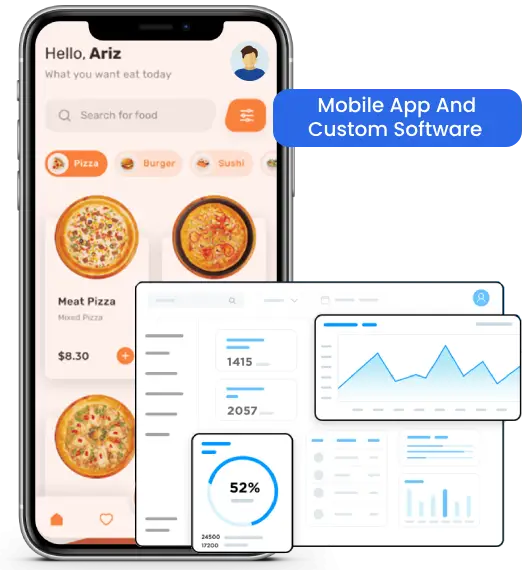E-commerce apps in the US face growing demands for faster support and round-the-clock availability. A modern shift toward automating customer service brings AI and chatbots to the forefront. These technologies respond instantly, handle multiple queries, and adapt to varied interactions. Smarter automation helps improve satisfaction, create consistency, and relieve human agents of repetitive tasks. Stronger engagement emerges when conversations feel natural and personalized. Focus turns toward implementing tools that not only scale but also connect with real user concerns. In this blog, we’ll discuss how chatbots and AI are reshaping customer service in e-commerce apps, examine their growing role in the industry, highlight the key advantages they offer, and take a look at what the future holds for this transformative technology.
Understanding Chatbots and AI Customer Service for Ecommerce Apps
Chatbot and AI customer service for ecommerce apps refers to the integration of artificial intelligence technologies into online retail platforms to handle customer support tasks efficiently. These AI-powered chatbots interact with users through conversational interfaces, typically via text or voice, providing instant responses to queries related to products, orders, returns, payments, and more. Unlike traditional customer service methods, AI chatbots are available 24/7, ensuring customers receive support at any time without delays.
These systems use natural language processing (NLP) to understand user intent and machine learning to improve over time, offering more accurate and personalized assistance. They can recommend products based on user preferences, assist in completing purchases, and resolve routine issues without human intervention. For e-commerce businesses, chatbot and AI customer service not only enhances the shopping experience but also helps improve ecommerce customer experience by reducing operational costs, boosting customer satisfaction, and enabling support teams to focus on more complex or high-value tasks.
How AI Chatbots for Customer Service Differ from Traditional Bots?
Rule-based bots follow rigid scripts and struggle beyond predicted paths. AI chatbots learn from conversations and evolve with user behavior. Traditional bots require manual adjustments whenever a new query variant appears. AI agents draw from training data and feedback loops to improve automatically. Context matters when AI remembers previous turns, whereas older bots treat each message as fresh. Newer platforms allow voice, text, and visual input to be understood under a unified model. Escalation flows become smarter as AI recognizes frustration signals. Flexibility comes through deeper understanding rather than just matching keywords. Automation becomes intuitive, not robotic.
The Growing Role of AI Chatbots for Customer Service in E-commerce
Strong market growth reflects the shift toward AI-powered customer support. According to a report by MarketsandMarkets, the AI for customer service market size reached USD 12.06 billion in 2024 and is projected to hit USD 47.82 billion by 2030. It reflects a compound annual growth rate of 25.8 percent. Automation features like chatbots, virtual assistants, and sentiment-analysis tools enable real-time support, faster query resolutions, and seamless omnichannel communication.
Research also shows that intelligent tools improve support operations significantly. Zendesk-backed insights highlight efficiency gains, with AI-powered ticket routing and summarization reducing average handle times by 27 percent. At the same time, service quality and customer satisfaction see measurable improvements. North American companies, especially in the US, are adopting AI solutions at a higher rate due to rising customer expectations and increasing digital commerce activity.
Scalability, personalization, and speed remain the top drivers of this growth. Cloud-based AI tools are easier to integrate into existing systems, which is accelerating adoption. Technologies like generative AI, automated workflows, and conversational AI for retail are becoming essential in delivering superior customer experiences. Businesses that invest now in intelligent automation are better positioned to compete, grow, and innovate.
Key Functions of AI Chatbots in Customer Service
AI chatbots have transformed the way e-commerce businesses handle customer service. The following are the key functions that highlight why AI chatbots have become indispensable tools for customer service teams.

Effortless Self-Service
One of the most powerful features of AI chatbots is enabling customers to help themselves quickly and easily. Bots can instantly retrieve order details, manage returns, and answer common status questions without human involvement. Advanced context-aware messaging ensures the chatbot understands user intent, transforming simple queries into clear, actionable responses. Customers receive immediate answers to questions like “Where is my package?” or “How do I pay?” reducing frustration and wait times.
Smart Routing and Escalation
Complex customer requests often require human intervention. AI chatbots assist by intelligently routing these cases to the appropriate agents, complete with enriched case summaries and suggestions for next steps. The system continuously evaluates conversation context and customer sentiment to decide whether to escalate a case or handle it automatically. Smart triage improves resolution speed and optimizes human agent workloads, allowing support teams to focus on issues that demand personal attention.
Personalized Customer Interactions
Personalization plays a critical role in creating engaging and meaningful customer experiences. AI chatbots analyze user behavior, purchase history, and abandoned carts to deliver tailored product recommendations and offers. Personalization encourages shoppers to explore relevant products, increasing conversion rates and average order values. Through conversational commerce, chatbots can suggest complementary items or special deals, making shopping both convenient and enjoyable.
Seamless Multi-Channel Support
Customers interact with brands across various platforms such as mobile apps, websites, email, and social media. AI chatbots maintain conversation continuity across all channels by retaining context and history. For example, a customer may initiate a chat within a mobile app and later continue via email without repeating information. The cross-channel consistency ensures a smooth user experience, reinforcing trust and satisfaction with the brand’s support system.
Data-Driven Insights and Continuous Learning
AI chatbots generate extensive data on customer interactions, which businesses can analyze to identify trends, common pain points, and opportunities for improvement. Developers use chatbot logs and performance metrics to refine responses, enhance workflows, and reduce friction in customer journeys. Continuous learning allows chatbots to adapt to new types of queries and evolving customer expectations, ensuring the system remains effective and relevant over time.
Advantages of an AI Chatbots in E-commerce
An AI chatbot for ecommerce brings remarkable improvements to e-commerce customer service by enhancing speed, availability, and efficiency. These systems not only support customers effectively but also reduce operational burdens for businesses. With their ability to handle high volumes of requests and provide personalized assistance, AI chatbots have become crucial tools in today’s competitive online marketplace. Here are the advantages of AI chatbots for e-commerce:
Lightning-Fast Response
One of the biggest benefits of AI chatbots is their ability to provide instant replies. Customers no longer have to wait minutes or longer for answers to their questions. Quick responses minimize frustration and keep shoppers engaged, which boosts customer satisfaction and loyalty over time.
Continuous Availability
AI chatbots operate without breaks, ensuring support is available every hour of the day, seven days a week. This means shoppers receive help during holidays, late nights, and weekends, regardless of their location or time zone. Constant availability significantly improves the overall customer experience.
Seamless Scalability
During peak sales events or promotional periods, chatbots handle surges effortlessly. They can manage thousands of simultaneous conversations without slowing down or crashing. Scalability allows businesses to serve more customers efficiently, even during unexpected traffic spikes, without the need to hire additional staff.
Cost Savings
Reducing reliance on human agents for basic and repetitive inquiries lowers operational expenses. Customer service teams can focus on complex or sensitive issues, while AI chatbots manage routine questions. These savings help companies allocate budgets toward growth and innovation while maintaining high service quality.
Consistent Brand Voice
AI chatbots deliver uniform communication by adhering to the company’s predefined tone, style, and messaging guidelines. Every interaction reflects the brand’s personality and values, ensuring a cohesive and professional experience across all customer touchpoints. Consistency helps build trust and brand recognition.
Lower Cart Abandonment Rates
Prompt and accurate answers to common concerns such as shipping, pricing, and returns help remove barriers at checkout. Chatbots engage customers in real time, offering the information needed to complete purchases confidently. Immediate support can significantly reduce the chances of shoppers abandoning their carts.
Valuable Business Insights
Chatbots collect rich data during customer interactions, providing actionable insights into behavior and preferences. Businesses can analyze this information to spot trends, identify pain points, and optimize processes. Data-driven approach supports smarter marketing campaigns, product improvements, and enhanced customer support strategies.
The Future of AI Chatbots in E-commerce
Rapid advancements in artificial intelligence are shaping the next generation of chatbots for e-commerce. Enhanced capabilities will enable chatbots to provide seamless support across multiple channels while addressing complex user needs more intuitively. Below are the future trends defining AI chatbots in e-commerce.

Conversational AI with Emotional Awareness
Chatbots will evolve from scripted interactions to dynamic conversations powered by generative AI. They will generate responses that reflect the customer’s emotions, context, and preferences in real time. By recognizing subtle cues such as frustration or satisfaction, bots will adapt their tone accordingly and know when to escalate issues to human agents. The emotional intelligence will make automated conversations more empathetic, engaging, and effective in building lasting customer relationships.
Voice Integration and Multimodal Interactions
Future AI chatbots will seamlessly combine voice and text communication, allowing users to interact in the way they find most natural. Shoppers may speak their requests aloud or type them, with AI accurately understanding diverse accents, slang, and phrasing. The multimodal approach enhances accessibility and convenience, enabling customers to check order status or receive personalized recommendations effortlessly. Such adaptability will significantly improve user satisfaction and broaden chatbot usability.
Immersive Experiences and Enhanced Security
Augmented reality features will merge with chatbot interfaces, offering interactive product demonstrations and visual overlays directly within conversations. Customers could point their cameras at items and instantly receive detailed information or assistance. Additionally, security protocols will safeguard sensitive data, verify user identity, and prevent fraud, all while maintaining smooth and frictionless experiences.
The Way Forward
AI chatbots are redefining customer service in the US e-commerce landscape. Faster support, better personalization, and reduced operational strain are only the beginning. Companies that adopt it as a progressive technology early gain a strong competitive edge, offering a service that is not just efficient but also human in tone and intent. Developers who understand how these systems function are uniquely positioned to build scalable, seamless, and user-friendly experiences that modern consumers expect. Partnering with an ecommerce app development company in the USA can further enhance the implementation of AI solutions, ensuring top-notch customer service integration.
As a leading ecommerce application development company, Dreamer Technoland specializes in designing, developing, and deploying custom AI chatbot solutions for e-commerce businesses. From real-time integrations with order systems to advanced natural language understanding and generative response modules, our team creates chatbots that do more than just answer questions. We solve problems, engage users, and strengthen your brand’s digital presence. Choose our custom e-commerce app development services to future-proof your customer service with AI that listens, learns, and delivers.
Related Articles to Ecommerce App Development
- How to Increase Your E-Store’s Revenue?
- 15 Best Ways to Speed Up Your Ecommerce Site
- Voice Commerce & Social Shopping: Building the Next Gen E‑commerce App
- Role of Ecommerce Mobile Apps in Shaping Modern Retail Strategies
- 10 Things to Consider When Building an Ecommerce Website
- What Are the Different Types of Ecommerce Applications?
- Top 5 Technologies for Building Ecommerce Platforms
- B2B eCommerce Platform Software Development Cost







